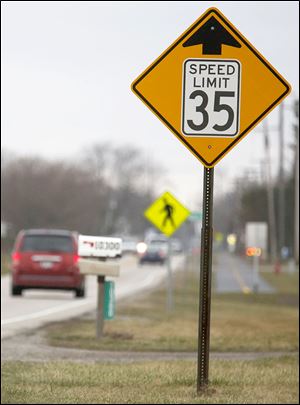
FEATURED EDITORIAL
Fraud as public policy
4/12/2017Drivers heading into Whitehouse on State Rt. 64 obey the posted speed limit about as well as anywhere else, Police Chief Mark McDonough said last month.
Legally, they don’t have to. The posted limit is 35 mph. The actual limit — 50. And that’s what Chief McDonough claimed his officers enforce.
Click here to read more Blade editorials

A sign in Whitehouse indicates that the speed limit is 35 mph in the village, but the real limit is 50 mph.
But records The Blade obtained from Whitehouse police include 10 citations issued to people who weren’t actually speeding.
Moreover, Chief McDonough told The Blade editorial board that his officers didn’t stop people for doing 51, but the tickets The Blade’s reporter found included three at that speed and another 16 at speeds of 52-55. Stopping someone doing 55 is appropriate in a 35-mph zone. In a 50-mph zone, it’s pretty hard to justify.
The tickets for “speeding” at 50 or below are worse than excessive. They are fraudulent. They should be refunded.
Village authorities can’t change the legal speed limit on state highways without the Ohio Department of Transportation’s approval. Years ago, Whitehouse put up the 35-mph signage anyway.
The Whitehouse village council considered posting another alternative speed limit sign last month, to cover an additional part of Waterville Street, but didn’t do it. Instead, the council decided on signage urging drivers to reduce their speed because a lower speed limit is coming.
Local governments are responsible for safety on their streets, and if the village council thinks it’s dangerous to have people doing 50 on Waterville Street, it should act.
But even if people obey fake speed limits, it would be a whole lot better to have a real one. That way, tickets wouldn’t be vulnerable to challenge. And that way, the village would not be engaged in fraud as official policy. That’s not good for local government, for faith in local democracy, or for local law enforcement.